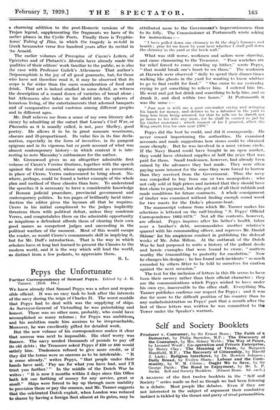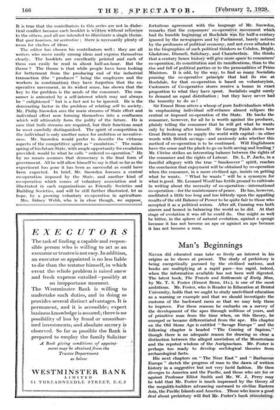Self and Society Booklets
Producer v. Consumer, by Sir Ernest Benn ; The Faith of a Democrat, by Philip Snowden, M.P. ; The Discovery of the Consumer, by Mrs. Sidney Webb ; The Way of Peace, by Leonard Woolf ; Co-operation and Private Enterprise, by Henry Clay ; The Meaning of Trade, by Margaret Bondfield, M.P. • The Recovery of Citizenship, by Harold J. Laski ; Religion Interferes, by Dr. Hewlett Johnson ; Daily Bread, by Evelyn Sharp ; Labour and the Com- munity, by W. M. Citrine ; Ought We to Save, by Sir George Paish ; The Road to Enjoyment, by Dr. L. P. Jacks. Self and Society Booklets. (Ernest Benn. 6d. each.) A READING of the first twelve booklets in the " Self and Society " series made us feel as though we had been listening to a debate. Most people like debates. Even if they are not interested in the subject of argument their combative instinct is tickled by the thrust and parry of rival personalities. It is true that the contributors to this series are not in dialec- tical conflict because each booklet is written without reference to the others, and all are intended to illithihiate a single theine. But gaol homines, tot sententiae ; there is necessarily plenty of room for clashes of ideas.
The editor has chosen his contributors well ; they are all writers who move easily among ideas and express themselves clearly. The booklets are excellently printed and each of them can easily be read in about half-an-hour. But the theme ? The theme is that while people have been looking for betterment from the producing end of the industrial transaction (the " producer " being the employers and the workers in combination) they have forgotten that the co- operative movement, in its widest sense, has shown that the key to the problem is the needs of the consumer. The con- sumer is animated by a self-interest which may not always be enlightened " but is a fact not to be ignored. He is the dominating factor in the problem of relating self to society. Mr. Philip Snowden sees the main streams of State effort and individual effort now forming themselves into a confluence which will ultimately form the polity of the future. He is sure that both streams are required, but their functions must be most carefully distinguished. The spirit of competition in the individual is only another name for ambition or inventive- ness. Mr. Snowden would prefer to describe the virtuous aspects of the competitive spirit as " emulation." The main- spring of his future gtite, with ample opportunity for emulation provided, would be what he calls " ordered co-operation." He by no means assumes that democracy is the final form of government. All he will allow himself to say is that so far as the experiment has gone it has been as successful as could have been expected. In brief, Mr. Snowden foresees a central co-operation imposed by the State, and another kind of co-operation which comes of voluntary association and is illustrated in such organizations as Friendly Societies and Building Societies, and will be still further illustrated, let us hope, by a growing voluntary co-operation in agriculture.
Mrs. Sidney Webb, who is in close though, we suppose,
fortuitous agreement with the language of Mr. Snowden, remarks that the consumers' co-operative. movement which had its humble begianiqd at _Rochdale Was fsa; half-a-ceritury ignored by the newipapers and by Parliament, barely noticed by the professors of political economy, and not even alluded to in the biographies of such political thinkers as Cobden, Bright,
Gladstone, Disraeli, Salisbury, and Chamberlain. She thinks , . that a century hence history will give more space to consumers' co-operation, its constitution and its ramifications, than to the rise and fall of political parties or to the personalities of Prime Ministers. It is Odd, by the way, to find so many Socialists praising the co-operative principle that had its rise at Rochdale, for that co-operation is based on voluntaryism. Customers of Co-operative stores receive a bonus in exact proportion to what they have spent. Socialists ought surely to demand an equal distribution ; but they have never had the temerity to do so !
Sir Ernest Berm utters a whoop of pure Individualism which in emphasizing individual self-reliance almost eclipses the central or imposed co-operation of the State. He backs the consumer, however, for all he is worth against the producer, plainly telling the consumer that he will get what he wants only by looking after himself. Sir George Paish shows how Great Britain used to supply the world with capital—in other words with British savings—and anxiously asks whether this method of co-operation is to be continued. Will Englishmen have the sense and the pluck to go on both saving and lending,? Mr. Citrine strikes an interesting balance between the rights of the consumer and the rights of Labour. Dr. L. P. Jacks, in a fanciful allegory with the true " Smokeover " spirit, reaches the conclusion that enjoyment will be obtained by co-operation when the consumer, in a more civilized age, insists on getting what he wants. " What he wants " will be a synonym for what is good. Mr. Leonard Woolf has fertile ground to cultivate in writing about the necessity of co-operation—international co-operation—for the maintenance of peace. He has, however, meditated a little too long and too bitterly upon the appalling results of the old Balance of Power to be quite fair to those who accepted it as a political axiom. After all, Canning was both sincere and honest in balancing the world as he did. At that stage of evolution it was all he could do. One might as well be bitter, in the sphere of natural evolution, against a sponge because it has not become an ape or against an ape because it has not become a man.









































 Previous page
Previous page